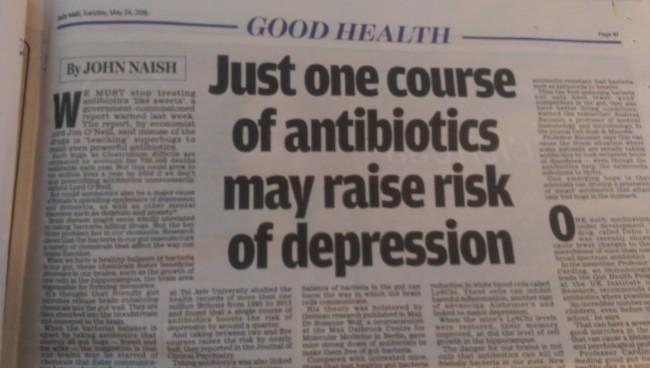Daily Mail scare stories: antibiotics and depression
It’s Health Tuesday in the Mail. Scare Story highlights are:
Page 47: “Just one court of antibiotics may raise risk of depression.” The thinking is if you take antibiotics, you cause in imbalance in bugs in your guts which upsets your brain cells’ ability to communicate.
You might have read the same tory in 2015, when it appeared on a website as, “Antibiotic exposure associated with increased risk for depression, anxiety.”
But what of one courts of antibiotics making you depressed?
Exposure to antibiotics was not associated with a change in risk for psychosis. A single course of antifungals was associated with a mild increase in risk for depression and anxiety, however, there was no increased risk with repeated exposures.
In The Gut Microbiome and the Brain, Leo Galland has more:
No, antibiotics do not directly cause panic attacks.
They can, however, exacerbate symptoms in those who already have anxiety disorders.
There has been a wealth of research in the recent years connecting gut bacteria to mental processes. This connection is aptly named the “gut-brain axis.” Antibiotics are prescribed to get rid of bacterial infections. Unfortunately, most antibiotics don’t just kill the bad bacteria, they kill the healthy bacteria living in your gut. This healthy bacteria has a lot of different functions, one being to line the gut and basically reinforce its “walls.” They can also influence neurotransmitters.
When you destroy these bacteria, it makes sense that you may notice a bodily change. This could be intestinal distress or mood changes. In scientific studies “germ-free” mice, or those without gut bacteria, are more reactive to stress than non-germ-free (normal) mice. It’s important to remember this is a mouse study, not a human study. It can give some important clues, but might not be the whole picture.
In short, antibiotics will not induce a panic attack, but may increase reactivity, making it more likely that a person prone to panic attacks will feel anxious. This can possibly turn into a panic attack, but with an established treatment regimen, it can be avoided.
You can read the the research first-hand here.
Posted: 24th, May 2016 | In: Reviews, Tabloids Comment | TrackBack | Permalink



